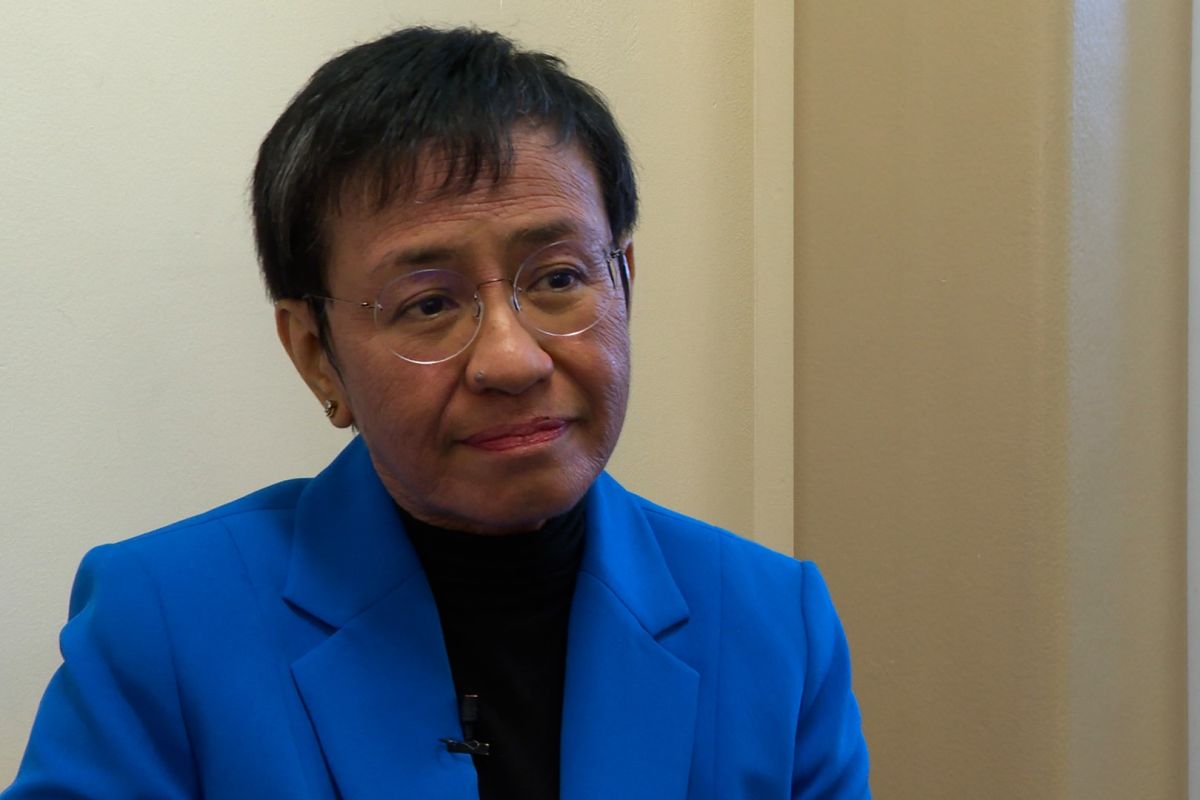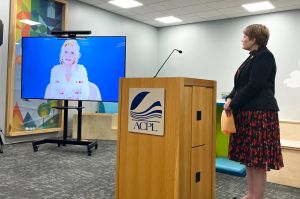
Maria Ressa, journalist and co-founded of Rappler, won a Nobel Peace Prize in 2021. Ressa delivered the keynote address at the Arnolt Center for Investigative Journalism Symposium on Thursday. (Alaina Davis, WTIU)
Nobel-prize winning journalist Maria Ressa knows a dictator when she sees one.
Ressa was awarded a Nobel Peace Prize for her work on former Philippine President Rodrigo Duterte and his "murderous anti-drug campaign" that killed thousands, NPR reported. Ressa faced criminal charges and harassment for her coverage of Duterte’s administration.
Ressa, CEO and co-founder of the Philippines-based digital news site Rappler, has also authored three books, including her most recent, “How to Stand Up to a Dictator: The Fight for the Future.”
Ressa delivered the keynote address for Indiana University’s Arnolt Center for Investigative Journalism Symposium on Thursday. In a Q&A with WFIU/WTIU News, Ressa discussed journalism and the state of democracy today.
This conversation was edited for length and clarity.
How do you think reporters — or even just an average person who happens to read this interview — can they resist threats to democracy? How can they feel like they have agency?
The attack against democracy is at the cellular level of democracy, which is the individual. That is what technology has enabled.
I think the first thing is to realize that how your country, how this country, how every democratic government survives this time period, depends on you. That's the question that I ask in “How to Stand up to a Dictator.” The question is simple: What are you willing to sacrifice for the truth?
These three sentences I've said over and over, I feel like Sisyphus and Cassandra combined. If you don't have facts, you can't have truth. Without truth, you can't have trust. Without these three, we have no shared reality. We can't have journalism, nor begin to solve any existential problems, like climate change. You can't have journalism, you can't have democracy.
Then push it forward one way, right, which is where the world is today. When trust is broken, if you get rid of trust, what system of government wins? A dictatorship. And so, this is the moment. It's death by 1,000 cuts. We lived through this in the Philippines. Don't normalize it. Hold the line. These are your rights. The Constitution says it. Don't voluntarily give up your rights.
And you're not alone. Pull your community together. This is the time for radical collaboration. It's collaborate, collaborate, collaborate. Because this will, this will determine the world we live in.
Sounds easier to say than to do, right? I think journalists in general, we’re trying to normalize a moment that isn't normal. We've lived through this in our part of the world. I remember in 2014 covering the Indonesian elections, and in order to find out what was happening, you had to watch two different networks. Hello, Americans. Does that sound familiar? We've gotten used to this, and the reality is that you still have a voice. But every day you do not use your voice, you lose your power.
I work in news, and the industry is changing, and it's struggling. So I'm wondering, how do you think journalists, especially young journalists, can persevere through these changes? You've experienced threats and harassment. How can they keep going?
The way we've created Rappler — this was before all of this began — but there were three concentric circles. Everyone does the Venn diagram. It's technology, journalism and community. Those three things, and the sweet spot is smack in the middle.
The first step is get rid of the technology that manipulates. We need to create a place where real people have real conversations in a shared reality. And moderate it the way we moderate the real world. You're not going to go out there and pull out an ax and start chopping someone down. Nor will you start yelling at the top of your voice.
I realized that we couldn't trust Silicon Valley to protect our public information ecosystem about three years ago. We began building what democratic governments should have done, which is a public tech stack. Today, as we prepare for our elections — the Philippine elections are in May — we have a matrix protocol chat app that we rolled out last year. We do have real people having real conversations. The content moderation is very simple. It's exactly what we do in the real world. So, the first is to get away from manipulative technology that weaponizes our data.
The second is, journalism needs to adapt. It's like a virus of lies has been released in our world. People are infected, and we are hitting the tipping point. It's the reason why you have multiple realities. We only live in one reality. This is a physical world. We can't fantasize different realities. You know when that happens? If there are 20 people in a room, and they have 20 different realities, that's what personalization offers. If that happens in the old world, we would have called that an insane asylum, right?
It's the reason why the world is crazy, and so we need to adapt to this environment. That requires moving out of the virtual world into the physical world. It requires radical collaboration. It isn't just PBS versus ABC or CBS. Actually, news organizations have to realize they're on the same side. They're on the side of facts and evidence-based reasoning, and that builds the third leg, which is community.
There's a community of people in my part of the world. In the Philippines, we have an average of 20 typhoons every year. If we gave a person looking for sanctuary the wrong information, that could be the difference between life and death. This climate change story is now happening everywhere around the world, including in the United States.
I said this in 2021 during the Nobel lecture. We're standing on the rubble of the world that was. We look at it, take it in, and then use the opportunity to build better. And this is going to be with you. The younger journalists who are walking in, seeing the problems and yet still wanting to be there.
In terms of what can we do policy wise? In April 2022, about 300 Nobel laureate civil society groups came up with a 10 point action plan.
The first: stop surveillance for profit. This is someone from this part of the world, Shoshana Zuboff, who came up with the phrase, the business model, “surveillance capitalism.” It is using our data, monetizing us for hundreds of billions of dollars a year. Stop surveillance for profit. This is my data. I have rights.
The second: stop coded bias. Joy Buolamwini, she's a Black Canadian-Kenyan woman who was trying to do her artificial intelligence exercise and couldn't do it because she was a Black woman. When she put a white face on, she could do it. Coded bias means that if you are a woman, LGBTQ+, if you are marginalized in the real world, an ethnic minority, you are further marginalized online. You could actually call this a new form of colonialism, because that code is replicated hundreds of millions of times.
Then the third one is us. Journalism as an antidote to tyranny. Very few influencers will go up against power, will put their safety on the line to stand up for the standards and ethics of a profession that helps keep the checks and balances of this democracy in place.
Associated Press reporters were barred from the White House. Obviously, Donald Trump and his administration have been hostile to reporters and journalists. I'm just wondering, as someone who has been blowing this whistle forever, where do you see the U.S. heading?
Oh, my God, where it is today. Everyone around the world is watching with grave concern. This is up to Americans and the Republican Party. Where America goes, the world will go. And what we're seeing is alarming. On the attacks on the press, let me quote Tim Snyder for you: “Do not obey in advance.” This is what I've said. It's in my book. “You have to hold the line.” You have to know this is where your rights are. This is what's in our Constitution.
In my case, there was like a bulldozer trying to get us to step back, and we held it. For journalists today, there will be many, many competing interests coming at you. I see the same things that happened in the Philippines happening in American news groups. If you give up voluntarily, you will not get it back.
I'll give you an example. In the Philippines, ABS-CBN is our largest broadcaster. I used to manage a news group of 1,000+ journalists. Everyone told me, "Maria, you should just shut up and talk to the Duterte administration.” I didn't accept any kind of invitations from the palace, because I knew that if I did, it opens a bigger can of worms. Which is, what are you willing to give up? For what? “Access,” is what people will say. But I will tell you this, Rappler was banned from the palace, and we covered it really well. You can cover everything. Do not trade your freedom for access.
Let me put it in the context of the Philippines. The people who own the business will always say, “Be careful. Duck.” But the people who are on the front lines, the reporters on the front lines, have to call a spade a spade. Because if you normalize it, you give up your freedom. And you will not get it back. The network in the Philippines — our largest network —their license to operate was taken away from them, and they've never gotten it back.
Although, in the Philippines, Duterte is gone, right? He had a one six-year term. So, I joked that we went from hell to purgatory. And I'm so worried that America is just heading to hell. It can get better, but it only gets better if you stand up for your rights.
Aubrey is our higher education reporter and a Report For America corps member. Contact her at aubmwrig@iu.edu or follow her on X @aubreymwright.











